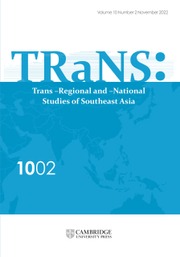Rising Islamism and the Struggle for Islamic Authority in Post-Reformasi Indonesia
Published online by Cambridge University Press: 10 September 2019
Abstract
The successful ‘Defending Islam’ rallies of 2016–2017 provide clear evidence that Islamism is on the rise in contemporary Indonesia. Mainstream Islamic authorities, including groups such as Nahdlatul Ulama and Muhammadiyah, are increasingly losing their authority to newer, more conservative Islamic preachers and groups. What explains this phenomenon – and what does it mean for the moderate perspectives that many predicted would dominate Islam in Indonesia in the post-Reformasi era?
This article argues that three main mechanisms can explain the rise of Islamism in Indonesia: 1) the creation of a ‘marketplace of ideas’ in post-Reformasi Indonesia and the way in which this marketplace has contributed to the rise of Islamism and the breakdown of Islamic authority; 2) the ascent of new Islamic authority figures, who propagate their views using new methods, ranging from social media to campus da'wa organisations and community-based activities (majelis taklim); and 3) the growing influence of new Islamic groups and preachers, who are building alliances with established religious elites and politicians. Such alliances strengthen the influence of new Islamic authorities, while further marginalising religious minorities, such as Ahmadi and Shi'a Muslims.
- Type
- Article
- Information
- TRaNS: Trans-Regional and -National Studies of Southeast Asia , Volume 8 , Issue 1 , May 2020 , pp. 37 - 50
- Copyright
- Copyright © Institute for East Asian Studies, Sogang University 2019
References
References
- 17
- Cited by




